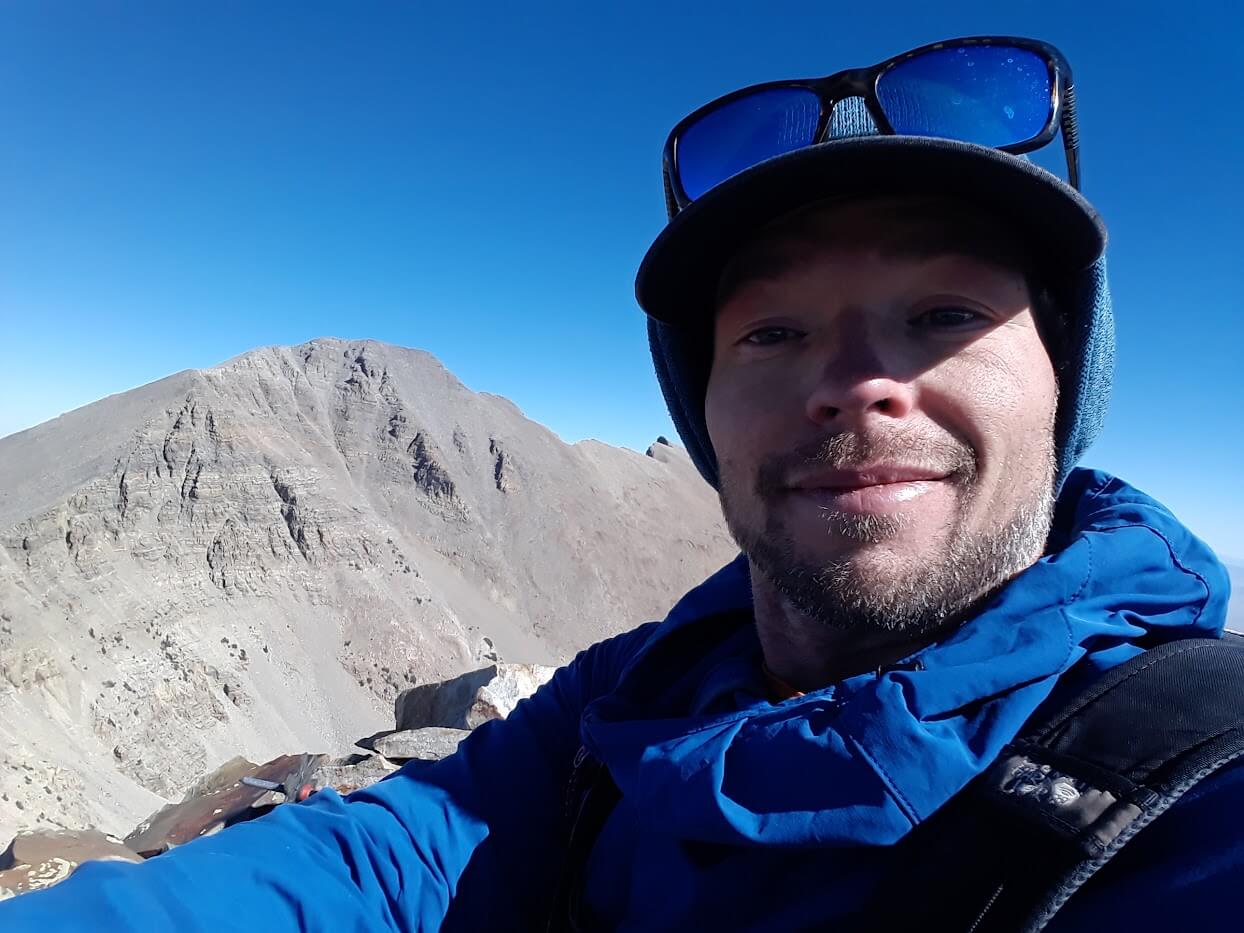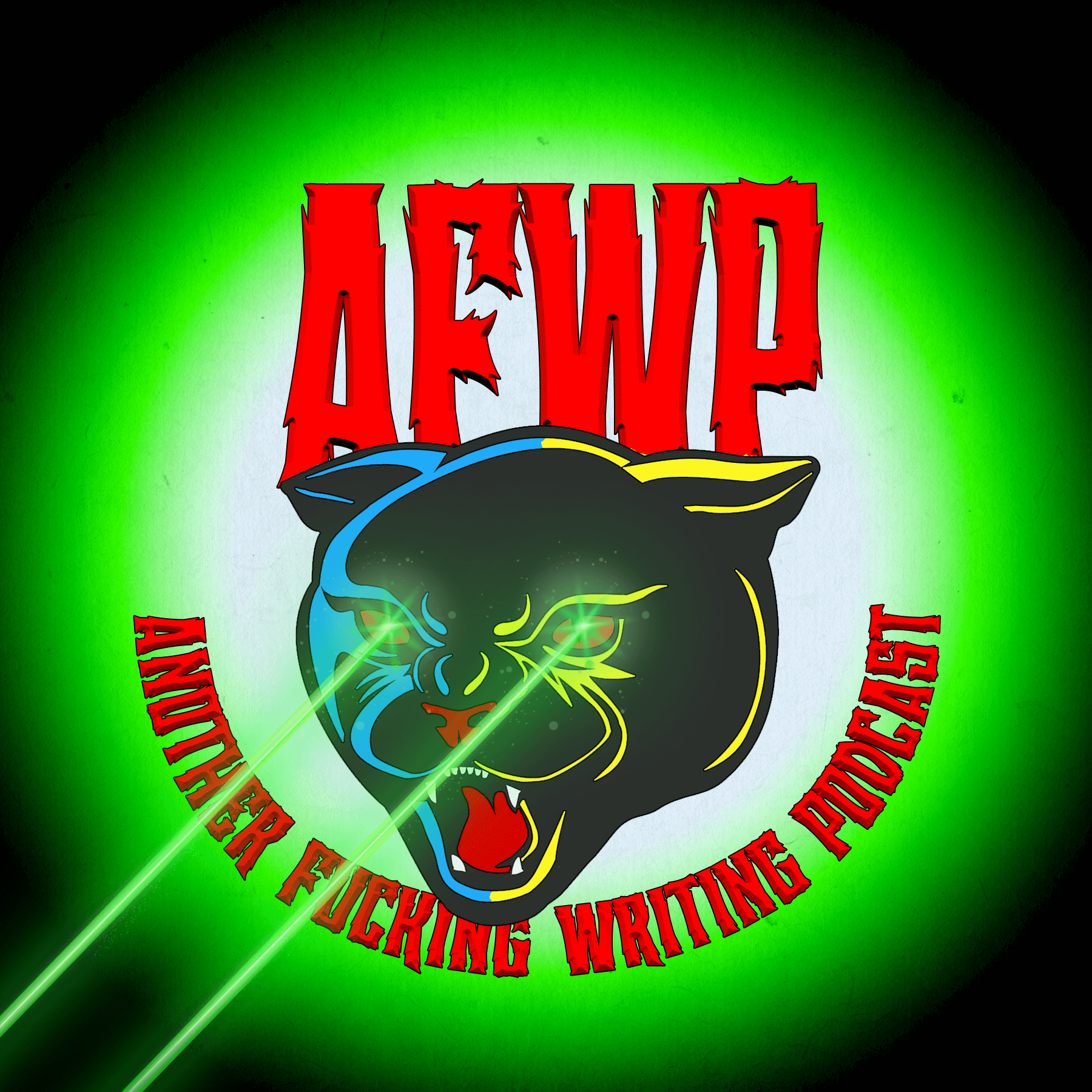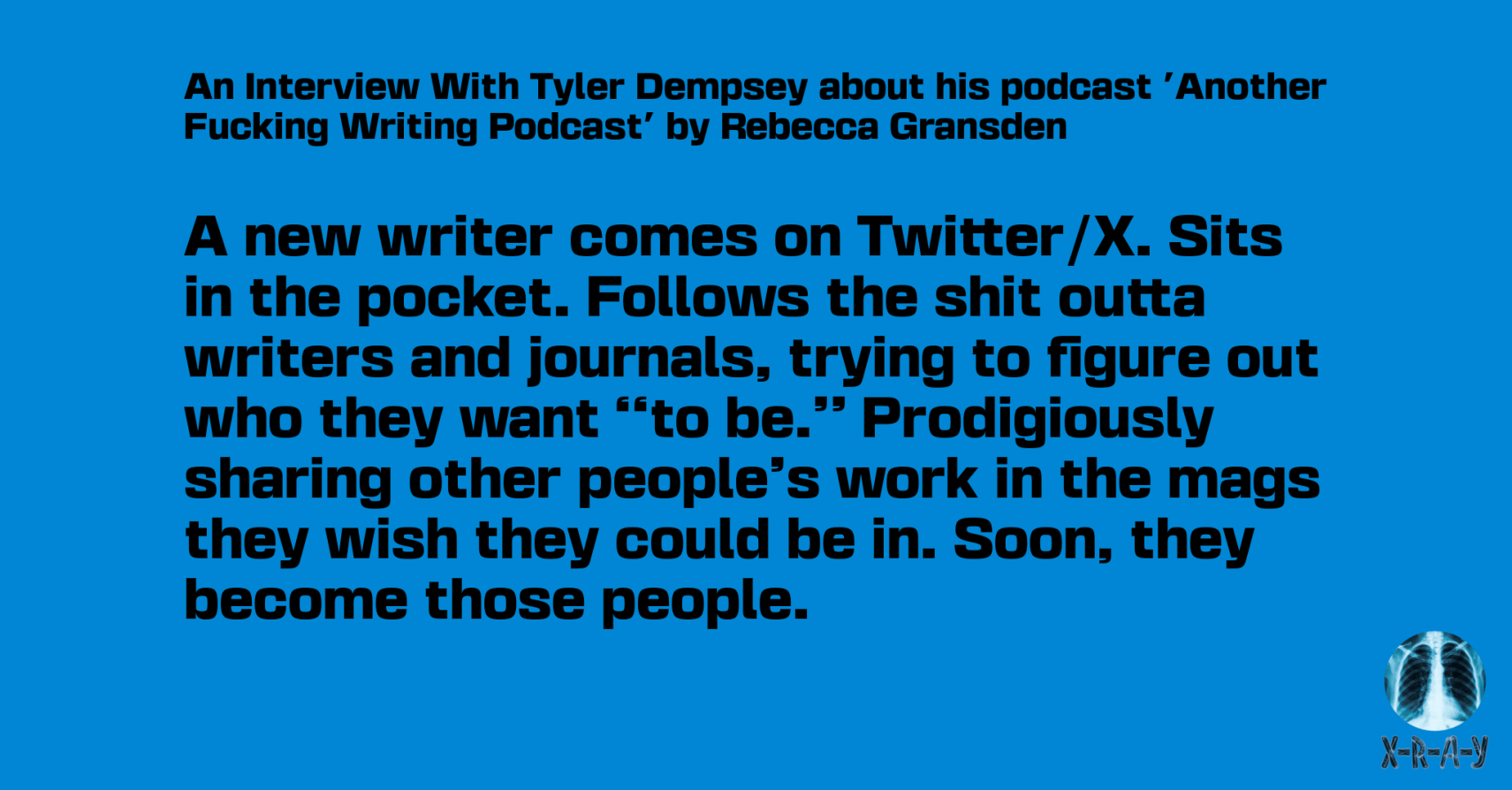Tyler Dempsey is the author of 4 books. He hosts Another Fucking Writing Podcast and lives in Utah with his dog. Another Fucking Writing Podcast can be found here and at Patreon.

Rebecca Gransden: How would you describe the podcast to someone who is unfamiliar with what you do?
Tyler Dempsey: It’s kind of a literary podcast. Kind of. I don’t know anything about writing. Don’t have the language to talk about craft or know what a Hermit Crabcake or Villanelle is. I just fell in love with books in college. And, when I’d finish a good one, always hunted information about the author. You’d probably think as a result I like biographies. But I don’t. I hate em. Cause they tell you what happened to a person but rarely anything about them. Their life. Personality. Whatnot. I’d find myself wishing we could have coffee and just talk about the ideas their book made me think about and learn what they felt like growing up and shit. So, that’s what I do.
RG: Does the podcast have a mission or manifesto?
TD: You know, that’s interesting. Not cause I have one. Not long ago, artists would find “their people.” Then make manifestos. It’s a funny word. Militant for what writing is capable of these days. Maybe I do need one? Shit. Okay. Here goes. I want writers to feel less alone. Like their books can come back to life after they thought they were dead. To be a doorjamb against the onslaught of reasons to give up.
RG: How long has the podcast been in existence, and how have you seen it grow over that time?
TD: The first episode came out January 15, 2023. Ten months ago. Course, there was research leading up. But not much. It’s kind of hard to track, in terms of “growth.” There isn’t the same sharing online as say, when a story comes out and everybody’s quote tweeting and it’s all right on display in front of you. And you watch the numbers climb as an artist gets bigger and bigger. Almost nobody shares podcasts. But they are listening. And I keep having surprises. Like when I reached out to Brian Allen Carr about an interview, and he was like, yeah, I’ve listened to a few episodes. We’d never spoken or interacted before. That was really cool. And recently I learned Scott McClanahan is a fan. Also, apparently, it’s getting discussed in graduate writing programs. Stuff like that. It’s growing through word-of-mouth or something. It’d probably help if I tried having a website or even creating an AFWP twitter profile instead of just posting from my stupid profile. For those curious about monetary gains, I have 12 Patreon supporters (shout out day ones!) who, before Patreon takes their slice, net me collectively $38 per month. Which, almost pays for the books I read to do the show. I think growth is more these experiences I get to have, and hopefully, you as a listener, have too.
RG: Where did the idea for the podcast come from?
TD: A new writer comes on Twitter/X. Sits in the pocket. Follows the shit outta writers and journals, trying to figure out who they want “to be.” Prodigiously sharing other people’s work in the mags they wish they could be in. Soon, they become those people. And there’s like a drug addict’s mentality, once you start getting pubbed, and other people are sharing your work, etc. Dopamine or not, it’s about as good a “community” feeling as they’ve ever had. Unless they’re a psychopath or independently wealthy and don’t have to work, there’s no WAY they’re going to keep in that game if they start writing books. Simply no time. In the couple years or whatever it takes to complete that novel that’s gonna rip indie lit a new asshole, the algorithm doesn’t remember them. And it’s really, really easy to be like, Why’m I doing this? It’s awesome people who’ve used social media to create community, but I feel as if that is an outlier. That’s where the idea for the podcast came from. I’m just trying something different. Hoping a real community springs from it.
RG: How did you decide upon a title for the podcast?
TD: Came up with a few and polled Twitter. This sweet baby was the winner.

RG: Are there any podcasts that influenced or encouraged you to start the project?
TD: I wouldn’t say influenced me to start, but WTF with Marc Maron is definitely an influence. All I’m doing is that, but with writers, not comedians.
RG: What episode of the podcast would you recommend to someone who is new to what you do?
TD: Maybe the Mike Nagel one? I think people just tapping in might expect more “literariness” to the show. And in that episode I’m pretty sure we don’t mention Mike’s book once. In my head, that conversation was even better without mentioning the book (which is amazing, if you haven’t read DUPLEX wtf are you even doing?) so yeah, that might give an indication what I’m aiming for.
RG: If your podcast features guests, how do you go about finding them?
TD: If you’re not a fan it makes for lazy interviews. So, that’s rule #1. Twitter’s my go-to for finding them. Seems the less “online” a writer is, the less chance they’re gonna talk to me. If I have to go hunting an author website or reach out to a publisher, I don’t have high hopes. If they have like four different publicist/agent emails as the route to contact them, unless you’re Brad fucking Listi, they aren’t getting back to you. Bout 1-in-3 authors refuse interviews for one reason or another or ghost me. So, it keeps you busy reaching out to people if you’re striving for an episode each week.
RG: If you are a writer, has the podcast impacted your writing life? and conversely, has a writerly disposition influenced the podcast?
TD: Michael Wheaton and I talked about this when he interviewed me on The Lives of Writers. Conversations stir up ideas, and those show up later in your writing. Or, in my case, monologues. The fact I meticulously prep for each conversation and strive for some semblance of an arc in the conversation as a whole, a kind of story or something, that’s writerly. I do a fair amount of editing to the audio, something else that sets my pod apart. Not only do “uhmms” and those little lip smacks get axed, also words/phrases I find myself cutting when I edit my writing. I’m considering the listener in a way that stems from being a writer. It all influences what ends up in the final cut.
RG: Do you listen to podcasts?
TD: Moreso now, then ever. I have a job that sees me alone/driving several hours a week.
RG: What is the best podcast out there at the moment, the one you are excited for when each new episode drops?
TD: May not be on radars, but The Martyrmade Podcast is hands down the best. Start with Episode # 8 on human sacrifice/cannibalism. If you aren’t hooked, you and I aren’t the same.
RG: What do you dislike about podcasts?
TD: When it’s three or four people and sounds like a bunch of dudes who are all wasting really good hairlines, holding Playstation/Xbox controllers, bro’ing out. Thinking of shows like The Dollop.
RG: Who is your dream guest?
TD: A.M. Homes, Brian Evenson, William T Vollmann, etc.
RG: Is there a podcast that doesn’t exist, but you wish did?
TD: I wish there was a SNL/Mystery Science/Drunk History kind of vibe podcast where dead writers, played by live ones, are interviewed and sort of drilled or riffed on.
RG: Is there a podcast that exists, but you wish didn’t?
TD: It’s the Era of the Podcast. So, no. I think even more should exist.
RG: For techheads, which single item of kit do you consider essential for the production of the podcast, and what would you say are the basics needed for those new to podcasting?
TD: Big fan of my Focusrite Scarlett Solo Interface. Also, I bought a new laptop with a lot of processing speed before I started. A huge investment. But, kind of cross pollinates to other things. I mean, I wrote my previous three books on a tablet, so now it feels like I’m in that giant world in Mario when I sit down to write. All I’d say to newbies is you can literally do this shit with your smartphone and an hour of YouTube videos, so don’t let the tech side turn you away from giving it a shot.
RG: If someone would like to support independent podcasts, what are the best ways to do this?
TD: Find the Patreon or Kofi or whatever and sign the fuck up. There’s usually a $5’ish option, which, let’s be honest, you won’t even notice. Even if produced haphazardly, it’s a shit ton of work getting episodes together and put out. If it seems like it’s professionally done, even a little bit, I promise that person is dedicating a huge chunk of their free time toward getting you something you can enjoy by barely lifting a finger. We tip our barista for steaming some damn milk for 30 seconds, I mean, come on.
RG: Looking back on the podcast, are there favorite episodes, episodes that stand out to you, or episodes that didn’t go as you would’ve liked?
TD: They’re all favorites. Always something memorable/unexpected when you go into an interview having never spoken and without rehearsing questions. Plus, it’s close to a miracle these days getting anyone to sit down at an agreed upon time to talk to you. I can’t even get my friends on the phone.
RG: What are your plans for the future?
TD: I can barely keep up as is. So, I guess, planning/hoping to sustain this drive and motivation as long as I can.
RG: If you liked that, you may also like this. Are there any podcasts on a similar wavelength to your own that you would recommend to a listener who appreciates what you do?
TD: The Lives of Writers, Otherppl, Beyond the Zero, WTF with Marc Maron, I’m a Writer, But.
Another Fucking Writing Podcast can be found here and at Patreon.

